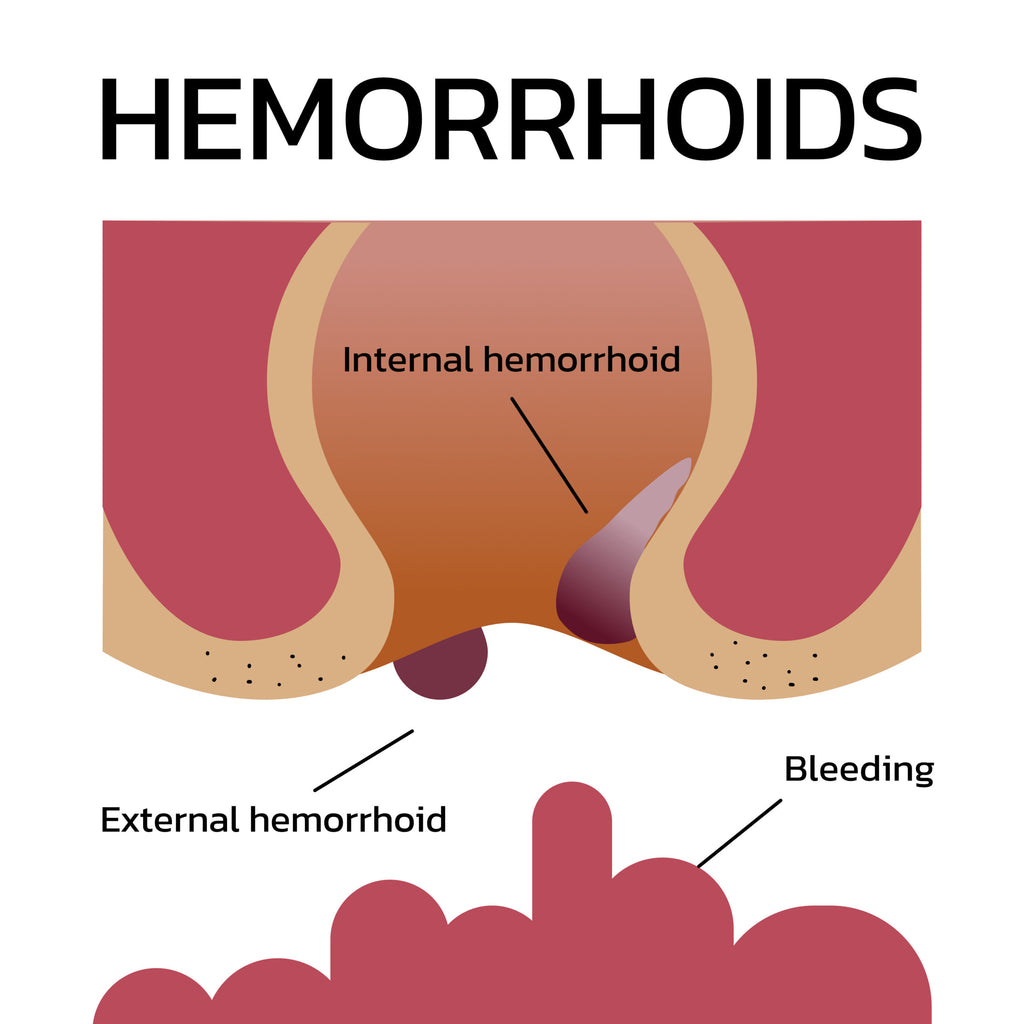Hemorrhoids
Hemorrhoids, commonly referred to as piles, are swollen veins in the lower part of the rectum and anus. They can be internal or external. Internal hemorrhoids are located inside the rectum and are generally less noticeable than external ones.
To stop internal hemorrhoids from coming back, it's important to stay healthy, keep clean, and get medical help when needed. Ignoring them can lead to discomfort and serious issues. Understanding what internal hemorrhoids feel like is crucial for recognizing symptoms early and seeking appropriate treatment.
The Initial Stages: Mild Discomfort
In the early stages, internal hemorrhoids may not cause any discomfort. The rectum has few pain-sensitive nerves, so small internal hemorrhoids may go unnoticed. However, as they enlarge, they may cause a sense of pressure or fullness in the rectum, especially during bowel movements. This sensation is often described as a dull ache rather than a sharp pain.
Bleeding: A Common Symptom
One of the most common symptoms of internal hemorrhoids is rectal bleeding. This bleeding occurs when you have a bowel movement. It can appear as bright red blood on toilet paper, in the stool, or in the toilet.
While this can be alarming, the bleeding is usually not severe. However, persistent bleeding can lead to anemia, so it should not be ignored.
Itching and Irritation
As internal hemorrhoids become more pronounced, they can cause itching and irritation around the anus. Itching around the anus is often caused by mucus from hemorrhoids irritating the sensitive skin in that area. Additionally, the constant moisture from mucus can make the area more prone to itching and inflammation.
Discomfort During Bowel Movements
Internal hemorrhoids can make bowel movements uncomfortable. The enlarged veins can make passing stool more difficult, leading to straining. Straining can make hemorrhoids worse, causing more pain and even leading to prolapse, where the hemorrhoid sticks out of the anus. When this happens, it can cause a feeling of a lump or mass during wiping.
Prolapsed Hemorrhoids: Increased Discomfort
In more advanced cases, internal hemorrhoids can prolapse or extend outside the anus. This can cause more discomfort because the prolapsed hemorrhoid can get irritated by clothing and sitting. Prolapsed hemorrhoids can also be painful if they become strangulated, meaning their blood supply is cut off. This condition requires immediate medical attention.
Pain and Thrombosis
Internal hemorrhoids are usually painless because the rectum lacks pain receptors. However, they can become painful if they prolapse, become strangulated, or if a blood clot forms within the hemorrhoid. Thrombosed hemorrhoids can be extremely painful and often require surgical intervention.
Psychological Impact
Beyond the physical symptoms, internal hemorrhoids can also have a psychological impact. The discomfort, bleeding, and itching can cause significant anxiety and embarrassment. Some people might wait to get help because they feel embarrassed. This can make their symptoms worse and cause more serious problems.
Causes and Risk Factors
Understanding what internal hemorrhoids feel like also involves recognizing the underlying causes and risk factors. Internal hemorrhoids are often caused by increased pressure in the rectum. This pressure can come from straining during bowel movements, chronic constipation, sitting for extended periods, or pregnancy. Other risk factors include obesity, a low-fiber diet, and heavy lifting.
Treatment: Home Remedies and Lifestyle Changes
For mild cases of internal hemorrhoids, home remedies and lifestyle changes can be effective in managing symptoms. Increasing fiber intake through diet or supplements can help soften stool and reduce straining. Drinking plenty of water and regular exercise can also promote healthy bowel movements.
Over-the-counter treatments such as hydrocortisone creams, suppositories, and sitz baths can provide relief from itching and discomfort.
Medical Procedures
For more severe or persistent hemorrhoids, medical procedures may be necessary. These can include:
- Rubber Band Ligation is a procedure used to treat hemorrhoids. During the procedure, a rubber band is placed around the hemorrhoid. This cuts off the blood supply to the hemorrhoid. As a result, the hemorrhoid shrinks and eventually falls off.
- Sclerotherapy: An injection of a chemical solution into the hemorrhoid to shrink it.
- Infrared Coagulation: A procedure using infrared light to coagulate the blood vessels in the hemorrhoid.
- Hemorrhoidectomy: A surgical procedure to remove large or prolapsed hemorrhoids.
- Stapled Hemorrhoidopexy: A procedure that uses a stapling device to reposition and secure the hemorrhoid tissue.
Preventing Internal Hemorrhoids
Preventing internal hemorrhoids involves adopting healthy bowel habits and making lifestyle changes to reduce the risk factors. Here are some tips to help prevent internal hemorrhoids:
- Eat a High-Fiber Diet: Include plenty of fruits, vegetables, whole grains, and legumes in your diet to keep stools soft and prevent constipation.
- Stay Hydrated: Drink plenty of water throughout the day to help maintain soft stools.
- Exercise Regularly: Regular physical activity helps promote healthy digestion and prevent constipation.
- Avoid Prolonged Sitting: Take breaks to stand and move around if you have a sedentary job or lifestyle.
- Use the Bathroom When Needed: Don’t delay bowel movements, as this can lead to harder stools and straining.
- Avoid Straining: Don’t strain during bowel movements, and take your time to let the stool pass naturally.
- Proper Hygiene: Keep the anal area clean and dry to prevent irritation and infection.
Conclusion
Understanding what internal hemorrhoids feel like is crucial for early recognition and treatment. While they can cause significant discomfort, there are effective treatments available. If you have symptoms like bleeding, itching, or feeling full in your rectum, it's important to see a doctor. With proper care and lifestyle changes, you can manage and prevent internal hemorrhoids, improving your overall quality of life.
To avoid internal hemorrhoids from coming back, it's important to stay healthy, keep clean, and see a doctor when needed.

